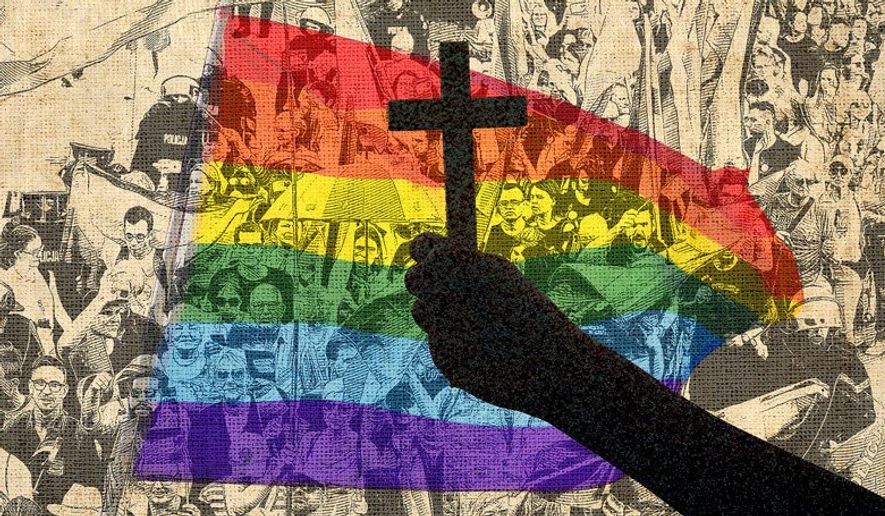OPINION:
There’s a passage in the 12th chapter of Luke’s Gospel which people find rather jarring. It’s where Jesus speaks of how he longs to set the world aflame with his message and, at the same time, warns that this will cause great division — even division within families.
These are not words we expect to hear from his lips, nor do we particularly like them. Given human nature, we tend to prefer religious messages of the “feel good” variety. I can tell you from long pastoral experience that people love singing, “Let There Be Peace on Earth,” a Broadway-style pop song that’s found its place in hymnals of just about all churches.
The Lord was never what you’d call “politically correct,” however. His words don’t reflect peacefulness as expressed in that song. And by the time Luke was recounting them in his Gospel — around the year 75 — those divisions which Jesus had predicted were well evident in Jewish and pagan families alike.
Conversions to the New Faith were creating deep stresses between parents and children, between siblings or with other relatives, even between husbands and wives. And for very real and tangible reasons: a family’s status, its wealth, its place in society, its security were all very much affected by the exercise of certain key religious practices.
Especially in Roman society, a family member who departed from the mos maiorum (the customs of the ancestors) by becoming Christian raised serious questions about that family’s cultic loyalty.
Concern for maintaining a family’s faith identity is still a reality. I’ve encountered this frequently when counseling young people who wish to marry across religious lines and find themselves confronting long-established family traditions.
Jesus’ words about division were as cautionary as they were evangelistic. He was calling on people to make a choice — and to be prepared for the consequences of that choice.
Those who hear the Gospel message now face the same situation. In a way, being a Christian is no easier these days than it was in biblical times.
As the standards of the early church were in opposition to those of Rome, Christianity today proposes a way of living that differs from the enticements of current popular culture. Following the Lord is still divisive. It requires a willingness to take risks and to endure criticism.
This was demonstrated recently by a Polish lad named Jakub Baryla. The 15-year-old took deep offense at Poland’s celebration of LGBT “pride,” which he saw as inconsistent with the faith of that very Catholic country (promotion of the event included a number of blasphemous images and presentations).
He stood in the path of a “pride” parade in the city of Plock, obstructing the march and holding a crucifix and rosary. Images of the police picking him up and carrying him out of the way have “gone viral.”
Jakub has been accused of seeking publicity on which to build a political career. But he insists he’s not interested in personal recognition. He wishes to become a priest, and he took such a public stand only because, “I wanted as many people as possible to see my gesture. I wanted [God] to make them reflect and discuss.”
In England, a 10-year-old girl named Kelsey and her classmate, a boy named Farrell, were suspended from school for being “homophobic” and asking to be excused from LGBT-focused lessons offered during “Pride Month.”
Kelsey, who is from a Pentecostal family, explained that she didn’t know what the word, “homophobic” meant, but that, “I think that they are trying to confuse children. Before all this happened, they [her schoolmates] were completely confident of who they were, but now they’re not.”
Michael Bowman, a software developer in Oregon, has refused to pay his taxes since 1999, because the government provides funding for abortion, which he strenuously opposes. He’s undergone a long legal battle and scored some technical successes. But he’s very likely to lose in the end.
This is a man who’s put his personal fortune where his principles are, even risking jail.
Now, I’m not encouraging anyone to disrupt parades or to not pay their taxes. Such dramatic acts of defiance aren’t for everybody.
I am encouraging you to seek the truth and to be attentive to what your children or grandchildren are learning in school. A young fellow came to me some time ago to tell me about how he got into trouble in school for using the wrong pronoun when referring to a boy who was “transitioning” into a “girl.”
Schools are teaching such things these days — things that not only contradict our faith but that ignore simple reality. That’s the kind of society in which we live.
You mustn’t be afraid to challenge the schools when such insanity occurs, or to challenge any authority, for that matter. Stand up for what’s right. Speak the truth in love.
Just know that there are risks. That’s what Jesus meant when he was talking about division. If you’re a Christian, you can’t go through life unscathed. There are always a few bumps and bruises.
And of course, some people do become actual martyrs for the faith.
In our “politically correct” era, with the media so given over to propaganda, with social pressure so strong and sensitivities so heightened, the tendency is to “go with the flow.” But to quote an old saying from the 1960s, the only thing that really goes with the flow is sewage.
Christians are called to do better. We’re called to be a light in this confused and gloomy age.
Recall the motto of The Christophers, that famous Catholic evangelistic society: “It’s better to light one candle than to curse the darkness.”
Let your light shine.
• Michael P. Orsi, a priest of the Diocese of Camden, New Jersey, currently serves as parochial vicar at St. Agnes Parish in Naples, Florida. He is host of “Action for Life TV.”




Please read our comment policy before commenting.